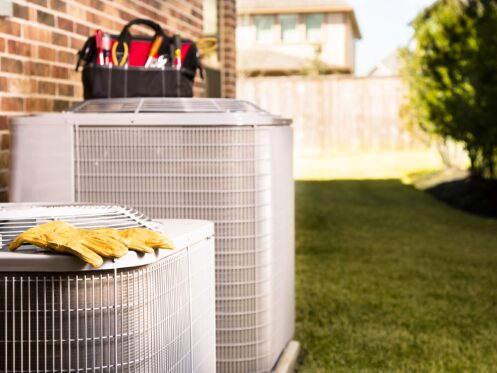The capacitor in your air conditioner might be small, but it has an essential task. This component stores energy to help your system get up and running. Air conditioners require a large burst of electricity to initiate cycles, so the capacitor essentially kickstarts the motor. Unfortunately, capacitors can start to fail over time. When they malfunction, your AC will struggle to cool your home. If you want to solve the problem quickly, it’s important to identify the warning signs of a malfunctioning capacitor.
1. Humming Noises on Startup
When your capacitor is damaged, your compressor must work harder at startup. This will result in a humming sound near the outdoor condenser unit. Of course, it’s normal for most AC systems to hum slightly as they run. However, if the humming noise is noticeably loud and occurs right when your AC turns on, it might mean your capacitor is broken.
2. Burning Smells Outside
If your capacitor has been broken for a while, other system components will start to fail. As the compressor begins to fail, it will generate a burning smell. Some say this smells like smoke while others might notice a sharp, sour scent. Typically, the burning smell will be centered around the outdoor condenser unit.
3. Hot Air Coming From Vents
A properly functioning capacitor allows your AC to start cooling air almost instantaneously. However, if it is failing, your AC will take longer to start cooling air. For the first several minutes of an AC cycle, you will have lukewarm, warm, or hot air blowing from your vents.
4. Unusually High Energy Bills
Without the extra energy stored in the capacitor, your air conditioner will need to pull in excess power to run. Even if you don’t notice any more obvious signs of a capacitor failure yet, you might find that your electricity bill is a little higher than usual. Of course, it’s normal for your energy bill to fluctuate a little throughout the year, but a sudden spike in costs is usually a sign something is wrong. To see what a normal bill is like for your current weather, check your electric bill history to see whether your bill was much lower in the same month of the previous year.
5. Sudden Shut-Offs Mid Cycle
Has your AC gotten into the habit of turning off even though it hasn’t cooled the house yet? Most people assume that means the thermostat is faulty, but it can happen due to a broken capacitor. Modern ACs usually have safety mechanisms that cause them to shut off if electrical levels fluctuate or parts of the system overheat. A faulty capacitor can trigger safety shut-offs and make your system randomly quit running.
6. Unusually Slow AC Startups
Since the capacitor is involved with your AC’s startup cycle, a faulty one can cause delays. Some people may notice that when they lower the temperature on their thermostat, it can take several seconds, or even a couple of minutes, for the air conditioner to turn on. In addition to lengthy delays, you might notice the air blowing more slowly or your fans rotating slower at startup.
7. An AC That Won’t Start
It usually takes capacitors a while to fail. However, if you ignore the issue, you will inevitably reach a point where the capacitor and all related systems quit working. Your AC might be refusing to start up due to automated safety shut-offs, or it might be so damaged it cannot run. Either way, you’ll find that when you try to turn on your air conditioner, it will stay silent and not blow out any air.
If you notice that your AC capacitor isn’t working properly anymore, it’s crucial to replace it quickly. A failing capacitor can damage other AC components, eventually breaking pricey parts like the compressor. To fix the issue promptly, turn to Sturm Heating & Air Conditioning. Our HVAC technicians can easily replace your capacitor and get your system running correctly again. We also help Spokane residents with various other HVAC repairs, maintenance needs, and installations. To learn more about our services, contact Sturm Heating & Air Conditioning today.


